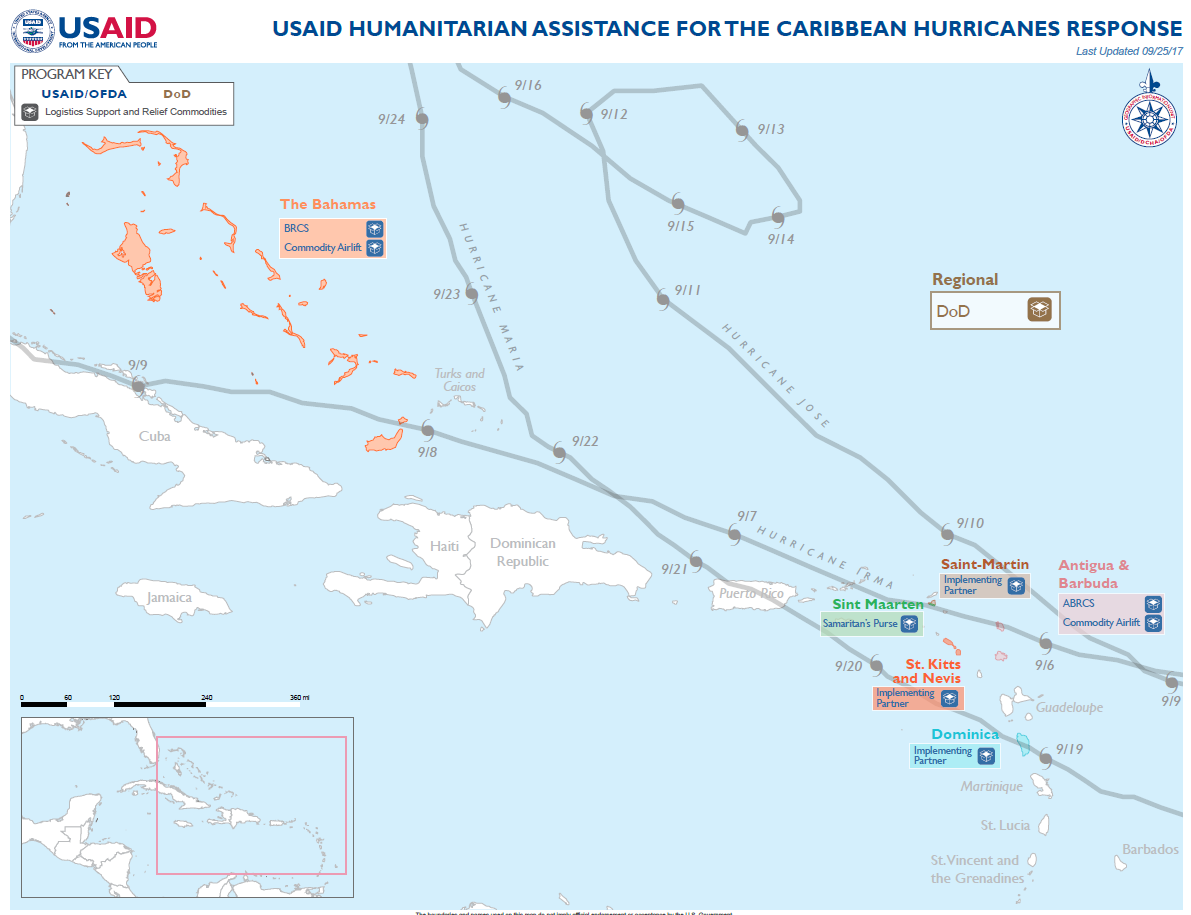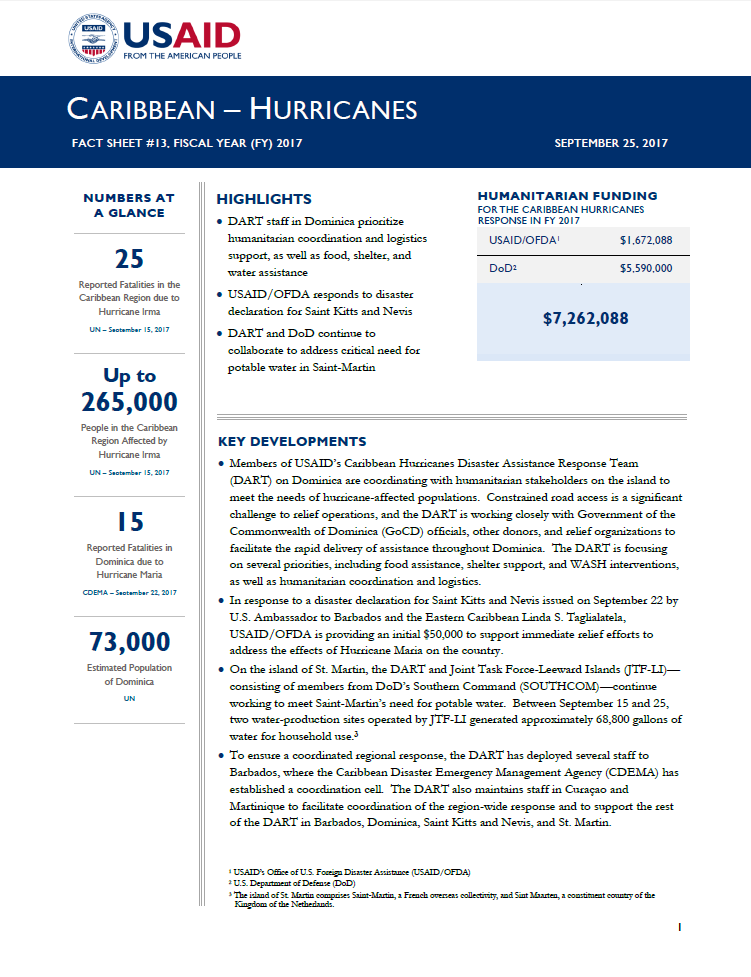September 25, 2017
Highlights
- DART staff in Dominica prioritize humanitarian coordination and logistics support, as well as food, shelter, and water assistance.
- USAID/OFDA responds to disaster declaration for Saint Kitts and Nevis.
- DART and DoD continue to collaborate to address critical need for potable water in Saint-Martin.
Key Developments
Members of USAID’s Caribbean Hurricanes Disaster Assistance Response Team (DART) on Dominica are coordinating with humanitarian stakeholders on the island to meet the needs of hurricane-affected populations. Constrained road access is a significant challenge to relief operations, and the DART is working closely with Government of the Commonwealth of Dominica (GoCD) officials, other donors, and relief organizations to facilitate the rapid delivery of assistance throughout Dominica. The DART is focusing on several priorities, including food assistance, shelter support, and WASH interventions, as well as humanitarian coordination and logistics.
Caribbean Hurricanes - Map #13 ![]() (pdf - 279k)
(pdf - 279k)
Numbers At A Glance
25
Up to 265,000
15
73,000
Humanitarian Funding
For the Caribbean Hurricanes Response in FY 2017
| USAID/OFDA | $1,672,088 |
| DoD | $5,590,000 |
| Total | $7,262,088 |
Caribbean Hurricanes - Fact Sheet #13 ![]() (pdf - 198k)
(pdf - 198k)
In response to a disaster declaration for Saint Kitts and Nevis issued on September 22 by U.S. Ambassador to Barbados and the Eastern Caribbean Linda S. Taglialatela, USAID/OFDA is providing an initial $50,000 to support immediate relief efforts to address the effects of Hurricane Maria on the country.
On the island of St. Martin, the DART and Joint Task Force-Leeward Islands (JTF-LI)—consisting of members from DoD’s Southern Command (SOUTHCOM)—continue working to meet Saint-Martin’s need for potable water. Between September 15 and 25, two water-production sites operated by JTF-LI generated approximately 68,800 gallons of water for household use.
To ensure a coordinated regional response, the DART has deployed several staff to Barbados, where the Caribbean Disaster Emergency Management Agency (CDEMA) has established a coordination cell. The DART also maintains staff in Curaçao and Martinique to facilitate coordination of the region-wide response and to support the rest of the DART in Barbados, Dominica, Saint Kitts and Nevis, and St. Martin.
REGIONAL
CDEMA has established a coordination cell in Bridgetown, Barbados, to facilitate the interaction between humanitarian and military actors supporting the CDEMA-led response, according to the DART. DART staff in Barbados are participating in daily meetings between the cell and humanitarian partners and are working with CDEMA to promote strong regional coordination.
DOMINICA
As of September 22, Hurricane Maria had caused at least 15 fatalities on the island of Dominica and left at least 16 people missing, CDEMA reports. The Category 5 hurricane affected the entirety of the island, damaged nearly all roofs, destroyed crops and agricultural infrastructure, and disrupted power and water supplies island-wide.
Obstructed road access—due to landslides, flooding, debris, or damaged bridges—remains a significant challenge to humanitarian operations on Dominica. As of September 25, roads from the capital of Roseau south to the village of Soufriere and from Roseau northeastward to the village of Laudat are impassible, although clearing efforts are underway, according to CDEMA and the Logistics Cluster, the coordinating body for humanitarian logistics activities. The main road from Roseau north to Portsmouth, the island’s second most-populated town, is accessible; however, debris continues to cover the road, and a risk of landslides persists. In general, road access in northern Dominica is less constrained than in the south, according to sources on the ground.
On September 24, USAID technical advisors for food assistance, shelter and settlements, and water, sanitation, and hygiene (WASH) arrived on Dominica, joining the DART members already in country. The DART is focusing on several humanitarian priorities, including food assistance, shelter support, and WASH interventions, as well as humanitarian coordination and logistics. Since September 21, when its members began arriving on Dominica, the DART has met regularly with GoCD officials, the UN World Food Program (WFP), the International Federation of Red Cross and Red Crescent Societies, other relief organizations, and other international donors to coordinate response efforts and to facilitate the rapid delivery of relief items around the island.
Two flights carrying USAID/OFDA emergency relief commodities are scheduled to arrive in Dominica during the week of September 25. The flights are carrying 2,400 water containers, 1,600 blankets, 1,000 hygiene kits, and 400 rolls of plastic sheeting. The plastic sheeting is expected to benefit an estimated 20,000 hurricane-affected people, while the other relief items are slated to assist 4,000 to 5,000 beneficiaries.
WFP, on behalf of the Government of Antigua and Barbuda (GoAB), distributed USAID/OFDA-provided water containers in the Roseau area on September 25. USAID/OFDA originally delivered the water containers to Antigua and Barbuda for the post-Hurricane-Irma response to meet the immediate needs of disaster-affected people on the two islands and to replenish stockpiles for future disasters. Following Hurricane Maria’s devastation, the GoAB provided the pre-positioned supplies of water containers to Dominica.
JTF-LI is supporting the U.S. Government (USG) international humanitarian response in Dominica. JTF-LI has supported the USAID-led relief efforts to hurricanes Irma and Maria since September 9.
SAINT KITTS AND NEVIS
On September 22, U.S. Ambassador to Barbados and the Eastern Caribbean Linda S. Taglialatela issued a disaster declaration for Saint Kitts and Nevis due to the effects of Hurricane Maria, which passed south of the two-island nation as a Category 5 storm on September 19. In response, USAID/OFDA is providing an initial $50,000 to support immediate humanitarian efforts.
On September 23, a USAID/OFDA disaster risk management specialist (DRMS) arrived on Saint Kitts and Nevis to conduct damage assessments and support the coordination of the humanitarian response. The DRMS has liaised with government officials and other stakeholders, including Saint Kitts and Nevis Red Cross Society representatives.
A shipment of 100 rolls of USAID/OFDA plastic sheeting—sufficient to benefit up to 5,000 people—is scheduled to arrive on Saint Kitts and Nevis during the week of September 25. The DRMS is coordinating with the Government of Saint Kitts and Nevis in preparation for the flight’s arrival and the distribution of the plastic sheeting.
ST. MARTIN
On September 25, SOUTHCOM Commander Admiral Kurt W. Tidd visited the island of St. Martin, meeting with members of the DART and JTF-LI, as well as representatives from the governments and militaries of France and the Kingdom of the Netherlands.
In coordination with the DART, JTF-LI has established and are operating eight lightweight desalination units in Saint-Martin to address the collectivity’s priority need for potable water. The JTF-LI set up four units each at two water-production sites. Between September 15 and 25, the sites generated approximately 68,800 gallons, or 260,440 liters, of water for household use. On September 24 alone, JTF-LI staff facilitated the distribution of 8,000 gallons, or 30,280 liters, of water to hurricane-affected populations in Saint-Martin, the DART reports.
The French Red Cross, in coordination with Saint-Martin authorities, is distributing emergency relief items at six distribution points in Saint-Martin, according to the DART. The organization is also conducting information campaigns across Saint-Martin to notify residents of health services and the locations and times of humanitarian distributions in the collectivity, as well as the government benefits available to them as French citizens.
In recent days, the DART has observed that more businesses, restaurants, and shops are opening in Sint Maarten, and various residents have informed the DART of water and power restoration in many neighborhoods. A shipment of 100 rolls of USAID/OFDA plastic sheeting is scheduled to arrive in Sint Maarten during the week of September 25.
INTERNATIONAL RESPONSE
On September 24, the Government of the United Kingdom Secretary of State for International Development Priti Patel announced £5 million, or approximately $6.7 million, in relief assistance for Dominica. The pledge brings the British government’s total planned contribution for the humanitarian response in the Caribbean, including the British overseas territories of Anguilla, British Virgin Islands, and Turks and Caicos Islands, to £62 million, or $83.4 million.
The Government of Australia reported plans on September 24 to provide 2 million Australian dollars, or approximately $1.6 million, to humanitarian partners to deliver critical assistance to hurricane-affected populations in the Caribbean.
On September 23, the Government of New Zealand announced a contribution of 250,000 New Zealand dollars, or nearly $182,000, toward the relief efforts for hurricanes Irma and Maria. The funding will enable the U.N. Development Program to support early recovery activities, such as debris management and restoration of essential services.
CONTEXT
Hurricane Irma—the strongest Atlantic hurricane on record—began affecting the eastern Caribbean in early September. On September 6, the hurricane made landfall over the island of Barbuda in the northeastern Caribbean before passing near The Bahamas, the Dominican Republic, and Haiti and making secondary landfall in Cuba on September 9. The hurricane brought destructive winds, heavy rainfall, and dangerous storm surge, resulting in at least 25 fatalities and causing significant infrastructure damage across the Caribbean.
On September 9 and 10, Hurricane Jose passed north of the Leeward Islands and proceeded into the North Atlantic Ocean, causing minimal impacts in the Caribbean region.
On September 6, U.S. Chargé d’Affaires, a.i., Lisa A. Johnson issued a disaster declaration in response to the anticipated effects of Hurricane Irma in The Bahamas, and on September 7, U.S. Ambassador to Barbados and the Eastern Caribbean Linda S. Taglialatela issued a disaster declaration in response to Hurricane Irma and the anticipated effects of Hurricane Jose in Antigua and Barbuda. In response, USAID/OFDA contributed an initial $100,000 each to the Bahamas Red Cross Society and the Antigua and Barbuda Red Cross Society.
On September 7, USAID activated a regional DART and stood up a Washington, D.C.-based RMT to coordinate the USG’s humanitarian response to the hurricanes.
On September 9, U.S. Embassy in Paris Chargé d’Affaires D. Brent Hardt issued a disaster declaration for the French Saint-Martin, and on September 10, U.S. Embassy in The Hague Chargé d’Affaires Shawn Crowley declared a disaster for Sint Maarten due to the effects of Hurricane Irma and anticipated effects of Hurricane Jose. In response, USAID/OFDA contributed an initial $100,000 each for activities in Saint-Martin and Sint Maarten.
On the night of September 18, Hurricane Maria passed directly over Dominica as a Category 5 storm, causing catastrophic damage across the island. On September 19, Ambassador Taglialatela issued a disaster declaration for Dominica, and in response, USAID/OFDA provided an initial $100,000 to address priority needs.
PUBLIC DONATION INFORMATION
The most effective way people can assist relief efforts is by making cash contributions to humanitarian organizations that are conducting relief operations. A list of humanitarian organizations that are accepting cash donations for disaster responses around the world can be found at www.interaction.org.
USAID encourages cash donations because they allow aid professionals to procure the exact items needed (often in the affected region); reduce the burden on scarce resources (such as transportation routes, staff time, and warehouse space); can be transferred very quickly and without transportation costs; support the economy of the disaster-stricken region; and ensure culturally, dietary, and environmentally appropriate assistance.
More information can be found at: USAID Center for International Disaster Information: www.cidi.org or +1.202.661.7710. Information on relief activities of the humanitarian community can be found at www.reliefweb.int.









Comment
Make a general inquiry or suggest an improvement.